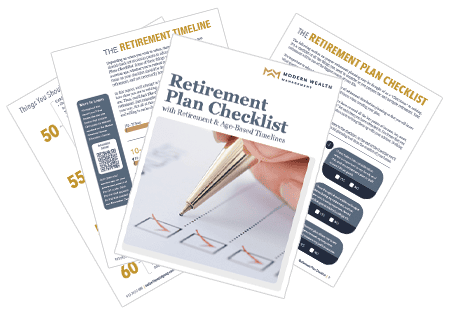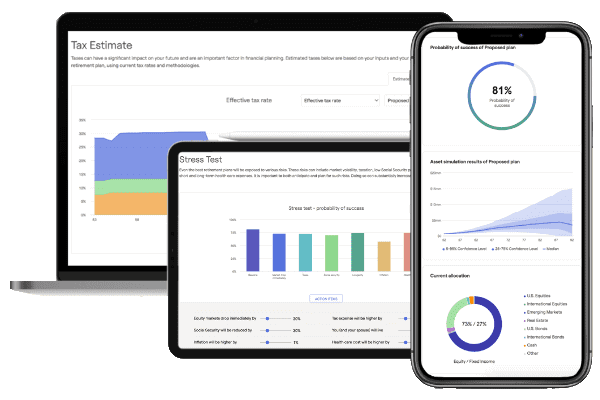Should I Have a 401(k) and a Roth IRA?
Key Points – Should I Have a 401(k) and a Roth IRA?
- What Are the Differences Between a 401(k) and Roth IRA?
- And What Are the Advantages of Each?
- Why It Makes Sense to Have a 401(k) and a Roth IRA
- 4 Minutes to Read
Should I Have a 401(k) and a Roth IRA?
Let’s say that you’re entering the workforce, getting a new job, or your employer is adding a benefit. How ever you’re getting access to a 401(k), you now have some decisions to make. One of those decisions is, “Should I have a Roth IRA when I have a 401(k)?”
Planning for retirement is an essential part of securing your financial future. The 401(k) and Roth IRA are popular options that individuals consider. While both offer attractive benefits, understanding the differences and advantages of each can help you make an informed decision. We’re going to explore the benefits of having a 401(k) and a Roth IRA to optimize your retirement savings.
What Is a 401(k)?
A 401(k) is an employer-sponsored retirement savings plan that allows employees to contribute a portion of their salary on a pre-tax basis. These contributions are then invested in a range of investment options chosen by the employer. One significant benefit of a 401(k) is that employers often match a certain percentage of the employee’s contributions, effectively boosting the amount saved for retirement.
The Advantages of a 401(k):
- Employer Match: The matching contribution provided by your employer is essentially free money, and who doesn’t love free money? It’s an excellent opportunity to maximize your savings and increase your retirement nest egg.
- Tax Benefits: Depending on if your employer offers a Roth option, or only traditional, there are tax benefits to both depending on how you look at the situation.
- Traditional 401(k) Contributions: Contributions to a traditional 401(k) are made on a pre-tax basis, reducing your taxable income for the year. This can result in immediate tax savings as you defer paying taxes on the contributed amount until you withdraw the funds during retirement.
- Roth 401(k) Contributions: While typically only applicable to the employee’s contribution and not the employer match (however that is changing), the advantages of a Roth 401(k) are that you pay the taxes on your contributions today, as presumably lower tax rates. That means when it comes time to start taking distributions from your 401(k), the Roth contributions and growth will come out tax-free. When tax rates are historically low, as that are today, the Roth has become more attractive. If rates are higher in the future, and you can withdrawal money tax-free, you’re avoiding potentially higher tax rates!
What Is a Roth IRA?
A Roth IRA is an individual retirement account that allows individuals to make after-tax contributions. Unlike a 401(k), a Roth IRA is not employer-sponsored and is solely funded by the individual. The contributions made to a Roth IRA are invested and can grow tax-free over time. Furthermore, qualified distributions from a Roth IRA are tax-free in retirement.
The Advantages of a Roth IRA:
- Tax-Free Withdrawals: One of the significant benefits of a Roth IRA is that qualified distributions are entirely tax-free. This means that any investment gains you accumulate over time can be withdrawn tax-free during retirement. Same rules apply here as they do for the Roth 401(k). With the potential for higher tax rates in the future, Roth can be a great vehicle since you will take money out of the Roth IRA tax-free. Avoiding the potentially higher tax rates on your savings.
- Flexibility: Roth IRAs offer more flexibility than 401(k) plans. Contributions to a Roth IRA can be withdrawn at any time without taxes or penalties, providing a source of emergency funds if needed.
Why Have Both a 401(k) and a Roth IRA?
The decision to have both a 401(k) and a Roth IRA is not an either-or choice but rather a strategic approach to maximize your retirement savings. Here’s why having both can be beneficial:
- Diversify Your Tax Situation: Having a mix of pre-tax and post-tax retirement accounts can provide flexibility when it comes to managing your tax liability during retirement. Withdrawals from a 401(k) are taxed as ordinary income, while Roth IRA withdrawals are tax-free. By having both, you can strategically withdraw from each account to optimize your tax situation.
- Employer Match and Tax Benefits: If your employer offers a matching contribution on your 401(k), it’s advisable to contribute at least enough to receive the full match. This ensures you’re taking advantage of the free money provided by your employer while benefiting from the immediate tax advantages.
- Hedge Against Future Tax Changes: Tax laws can change over time, and having a mix of pre-tax and post-tax retirement accounts can provide protection against potential future tax increases. By having a 401(k) and a Roth IRA, you have options to adjust your withdrawals to minimize the impact of tax changes.
Why Having a 401(k) and Roth IRA Makes Sense
In short, having a 401(k) and a Roth IRA can be a smart strategy to optimize your retirement savings. The 401(k) allows you to take advantage of employer matches (free money, woohoo!) and immediate tax benefits, while the Roth IRA provides tax-free withdrawals in retirement and more flexibility. By diversifying your retirement savings and taking advantage of the benefits of each account, you can build a solid financial foundation for your future.
We Can Assist You with Your Retirement Planning Needs
If you’re looking to identify your best retirement saving strategy, we’re here to help. You can schedule a conversation with one of our CFP® Professionals—either a 20-minute “ask anything” session” or complimentary consultation, by clicking here. You have the option of meeting with us in person, virtually, or by phone.
We also have a handy guide to help you make retirement decisions, the Retirement Plan Checklist. The checklist includes 30 checklist items to review as you plan for retirement, an age-based timeline, and a timeline of events to address as you approach your retirement date.

Lastly, you can see how having a 401(k) and a Roth IRA could work for you by using our industry-leading financial planning tool. Building a comprehensive financial plan is critical to giving you more confidence, freedom, and time in retirement. This is the same tool that our CFP® Professionals use and you can use it at no cost or obligation. Just click the “Start Planning” button below and you’ll be on your way.

And, of course, if you have any questions as you’re building your plan, please don’t hesitate to reach out to us. It’s important to us that you have clarity leading up to and through retirement. Whether you’re wondering if you should have a 401(k) and a Roth IRA or whatever it may be, we’re ready to answer your retirement questions.
Resources Mentioned in This Article
- Optimizing Your 401(k) for Retirement
- Converting to a Roth IRA: What Are the Pros and Cons?
- DIY Retirement Planning: What Can Be Overlooked?
- Retirement Savings by Age
- Traditional Versus Roth 401(k)
- New Retirement Rules Passed by Congress
- Tax Rates Sunset in 2026 and Why That Matters
- What Is Tax Diversification?
- What Is Tax Planning?
Investment advisory services offered through Modern Wealth Management, LLC, an SEC Registered Investment Adviser.
The views expressed represent the opinion of Modern Wealth Management, LLC, an SEC Registered Investment Adviser. Information provided is for illustrative purposes only and does not constitute investment, tax, or legal advice. Modern Wealth Management, LLC does not accept any liability for the use of the information discussed. Consult with a qualified financial, legal, or tax professional prior to taking any action.